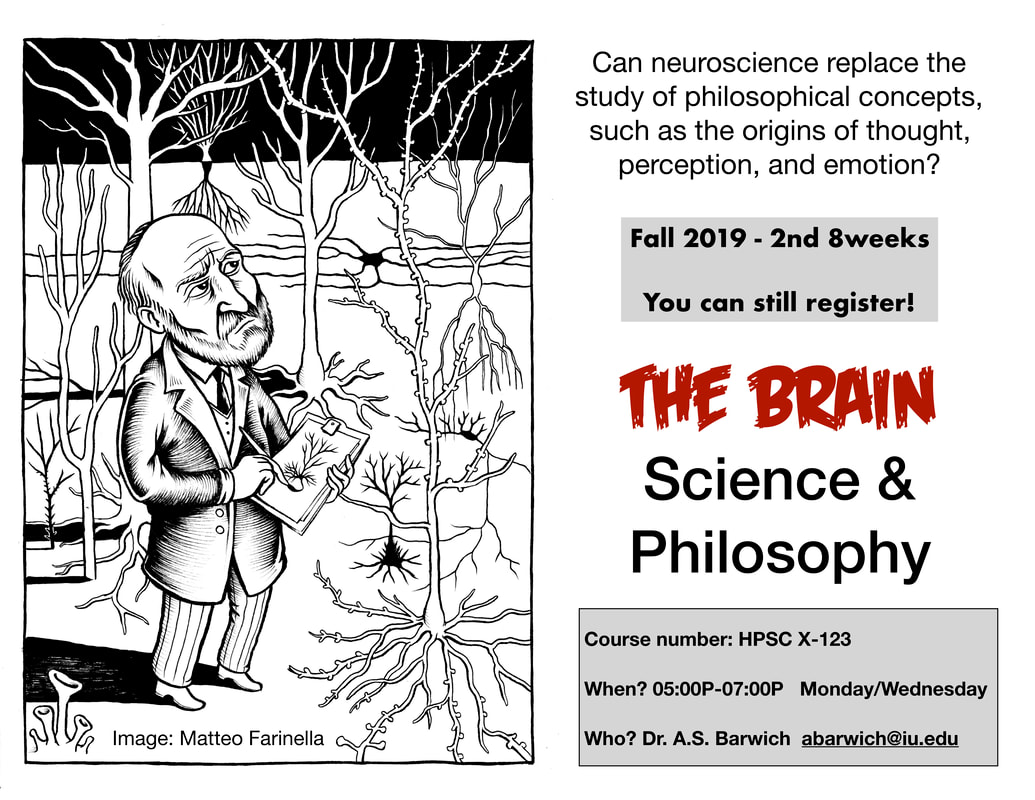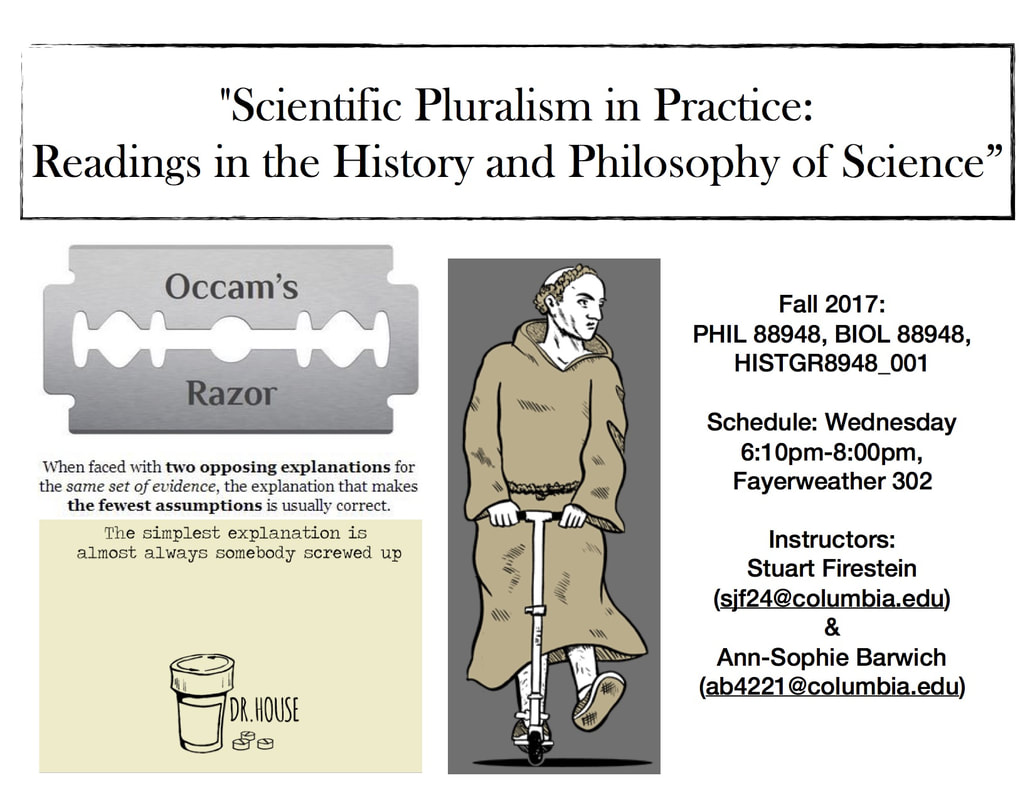Current Courses
| |||||||||
| sp20__phil_fndtns_cognitive_info_sci__11967.pdf |
FA19: FOUNDATIONS OF COGNITIVE SCIENCE (COGS Q240/UNDERGRAD)
Course Description
Does modern science challenge our deep-seated, philosophical conception of ourselves as human agents with rational beliefs?
Cognitive Science is a relatively young but vastly advancing, multidisciplinary field at the intersection of experimental studies of the brain and general theories of cognition. It emerged about 60 years ago from developments in philosophy, computer science, psychology, and linguistics. This course revisits the main philosophical topics underpinning the modern science of mind and aims to apply this understanding to selected cutting-edge issues. Central to the rise of cognitive science were new ideas about how minds could be understood in computational terms: the computational theory of mind. However, developments in neuroscience, psychology, and philosophical approaches to cognition and robotics, have caused some to question whether cognitive science should remain committed to the computational theory of mind. In this course, students will learn about the original promise of the computational theory, and how it provided an alternative to earlier philosophical and scientific views about the relationship between mind and body. We will go on to debate whether embodied and social processes amount to an overthrow of the computational paradigm.
Specifically, we will cover four thematic parts: (1) computational theories of mind and brain; (2) mind-brain identity and dualism (and zombies); (3) embodied, extended, and social cognition; (4) perception.
Course Description
Does modern science challenge our deep-seated, philosophical conception of ourselves as human agents with rational beliefs?
Cognitive Science is a relatively young but vastly advancing, multidisciplinary field at the intersection of experimental studies of the brain and general theories of cognition. It emerged about 60 years ago from developments in philosophy, computer science, psychology, and linguistics. This course revisits the main philosophical topics underpinning the modern science of mind and aims to apply this understanding to selected cutting-edge issues. Central to the rise of cognitive science were new ideas about how minds could be understood in computational terms: the computational theory of mind. However, developments in neuroscience, psychology, and philosophical approaches to cognition and robotics, have caused some to question whether cognitive science should remain committed to the computational theory of mind. In this course, students will learn about the original promise of the computational theory, and how it provided an alternative to earlier philosophical and scientific views about the relationship between mind and body. We will go on to debate whether embodied and social processes amount to an overthrow of the computational paradigm.
Specifically, we will cover four thematic parts: (1) computational theories of mind and brain; (2) mind-brain identity and dualism (and zombies); (3) embodied, extended, and social cognition; (4) perception.
| fa19__foundations_of_cognitive_sci__1560.pdf |
FA19: THE BRAIN. SCIENCE AND PHILOSOPHY (HPSC X123/UNDERGRAD)
Course Description
A popular meme states: "The brain is the most important organ you have. According to the brain." Neuroscience is a relatively recent area of study, however. A series of revolutionary experiments in the 1950s founded the field of modern neuroscience. In this course, we will examine basic concepts and important experiments in modern brain science. We will also discuss whether neuroscience can replace the study of traditional philosophical concepts such as the origins of thought, perception, and emotion.
Background knowledge in neuroscience or philosophy is not required.
Course Description
A popular meme states: "The brain is the most important organ you have. According to the brain." Neuroscience is a relatively recent area of study, however. A series of revolutionary experiments in the 1950s founded the field of modern neuroscience. In this course, we will examine basic concepts and important experiments in modern brain science. We will also discuss whether neuroscience can replace the study of traditional philosophical concepts such as the origins of thought, perception, and emotion.
Background knowledge in neuroscience or philosophy is not required.
| fa19__perspectives_sci_social_hist__37208.pdf |
Previous Courses
(Columbia University)
COURSE DESCRIPTION
The course centers on ideas associated with Pluralism as applied to scientific practice. Pluralism itself has had a long tradition in the historical and political study of the individual and society, and it was championed, for example, by Isaiah Berlin in the 20th century. However, pluralism as a normative position has only rarely been applied to science studies (Charles S. Pierce, might be an exception here). More recently several philosophers of science have begun exploring the role for pluralism in scientific practice (Hasok Chang, Helen Longino, Stephen Kellert, for example). We examine the historical development of science towards an increasingly monistic practice and consider the philosophical and practical promises as well as challenges of driving science in a more pluralistic direction.
Scientific Pluralism is the philosophical view stating that science is most progressive when it maintains and works with various, sometimes even conflicting, models and methods. This may appear counterintuitive at first: How can we pursue and identify good science if anything goes? How do we avoid relativism in the objective study of scientific phenomena? This course will discuss the benefits and limits of such a pluralistic idea of science and how it translates into practice. The course is run as a seminar in historical and philosophical studies of science for students of the sciences (particularly biology and neuroscience) as well as the humanities. We will look at examples from neuroscience general biology, and other areas from the history of science (e.g., chemistry and medicine).
The course aim is to discuss and develop pluralism as a methodological, policy and educational tool by looking at the fruitful interaction of alternative explanations in historical cases and the heuristics of developing counterfactual histories for modern research.
No prerequisites are required.
The course centers on ideas associated with Pluralism as applied to scientific practice. Pluralism itself has had a long tradition in the historical and political study of the individual and society, and it was championed, for example, by Isaiah Berlin in the 20th century. However, pluralism as a normative position has only rarely been applied to science studies (Charles S. Pierce, might be an exception here). More recently several philosophers of science have begun exploring the role for pluralism in scientific practice (Hasok Chang, Helen Longino, Stephen Kellert, for example). We examine the historical development of science towards an increasingly monistic practice and consider the philosophical and practical promises as well as challenges of driving science in a more pluralistic direction.
Scientific Pluralism is the philosophical view stating that science is most progressive when it maintains and works with various, sometimes even conflicting, models and methods. This may appear counterintuitive at first: How can we pursue and identify good science if anything goes? How do we avoid relativism in the objective study of scientific phenomena? This course will discuss the benefits and limits of such a pluralistic idea of science and how it translates into practice. The course is run as a seminar in historical and philosophical studies of science for students of the sciences (particularly biology and neuroscience) as well as the humanities. We will look at examples from neuroscience general biology, and other areas from the history of science (e.g., chemistry and medicine).
The course aim is to discuss and develop pluralism as a methodological, policy and educational tool by looking at the fruitful interaction of alternative explanations in historical cases and the heuristics of developing counterfactual histories for modern research.
No prerequisites are required.
| scientific_pluralism_in_practice_syllabus.pdf |

